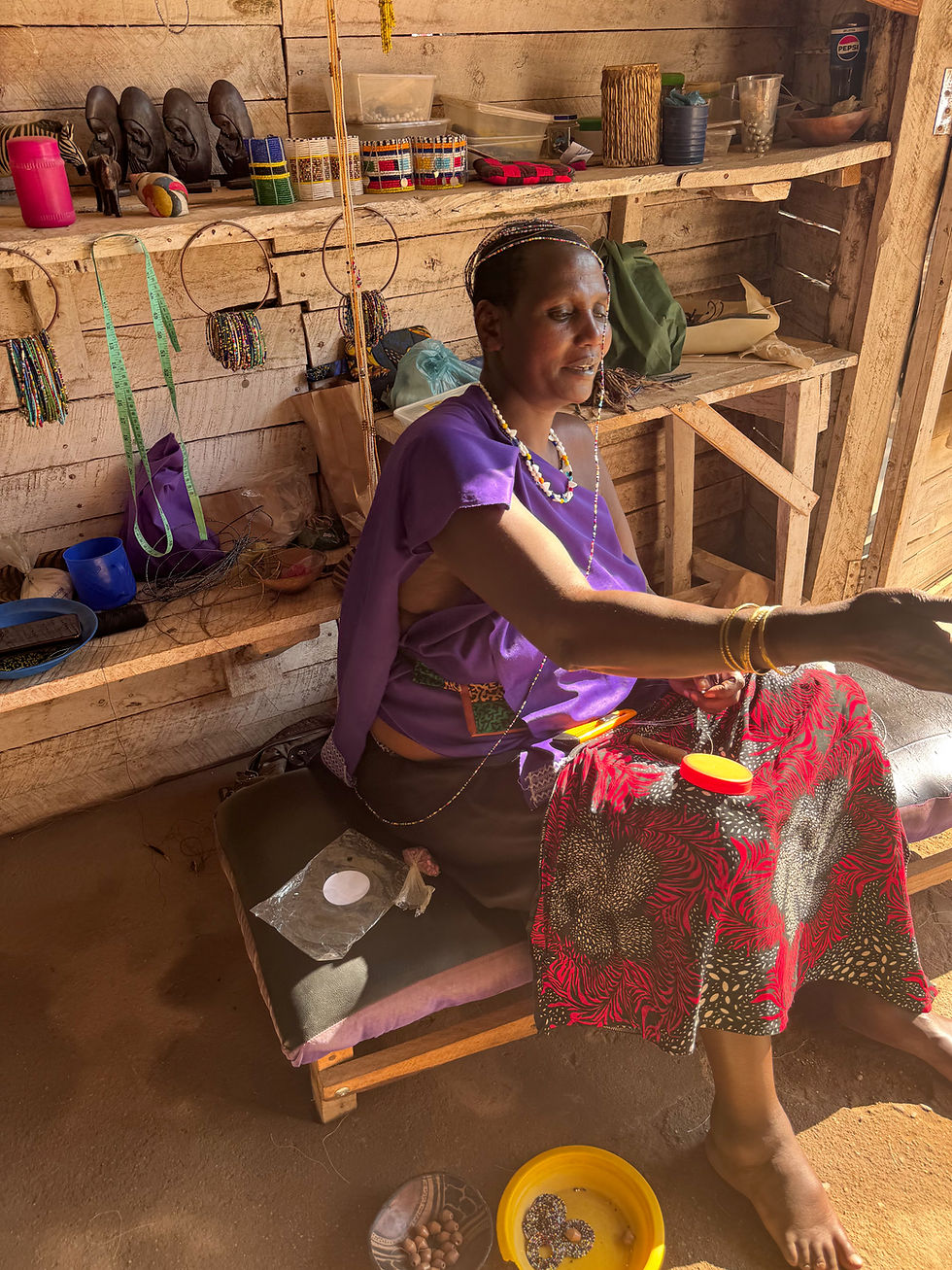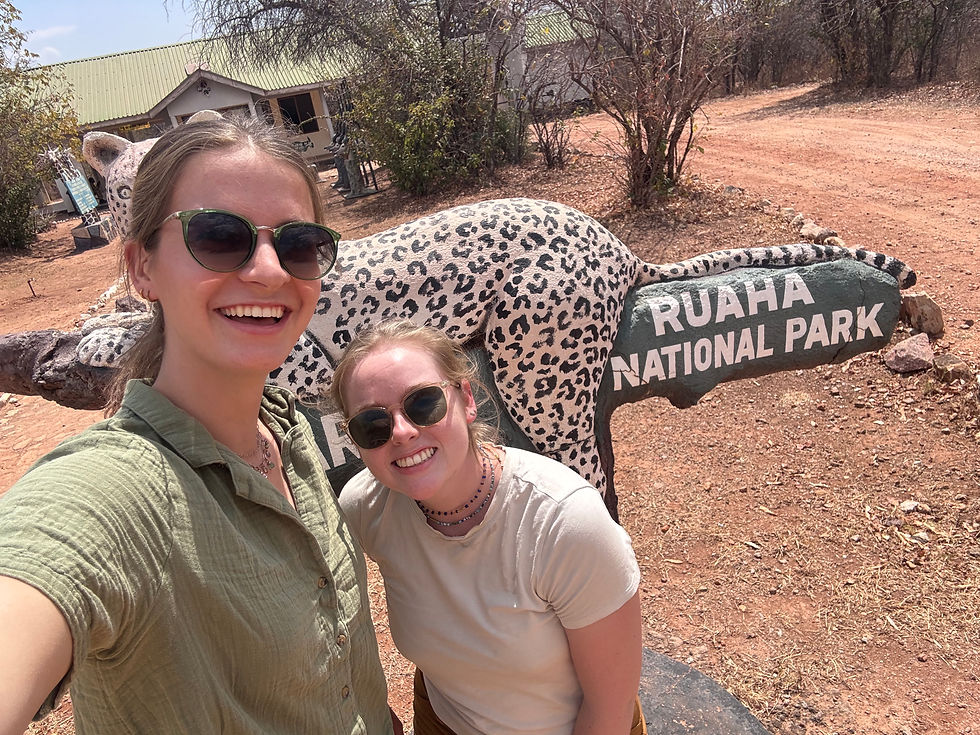Week 3
- Lucy P-BARG
- Jun 29, 2025
- 6 min read
Updated: Jan 9
Research Reflection: Systems, Symptoms, and the Edges of Care
This week, the hospital felt less like a mystery and more like a system I’m beginning to see more clearly. It is messy and layered, and constantly negotiating between patient needs and heavy resource limitations. We began Monday with a shift in dynamics: Dr. Rachel, often guarded, invited us to chai. It felt like a small threshold crossed. There was a story at chai about hospital staff infusing a Jehovah’s Witness patient with blood at night in Dodoma, since the patient's family kept refusing a transfusion. This workaround was ethically questionable and reveals the kinds of compromises that are made here when policy and clinical urgency collide. In the ICU, we saw the consequences of assumptions. One patient with abdominal pain was fasted for surgery the night before under the suspicion of an umbilical hernia by the intern on call, but Chief Mkumbi reassessed and instead attributed her symptoms to undiagnosed diabetes. Her blood sugar had dropped dangerously low. This highlighted how quickly surgery is suggested here to interns who haven't learned the steps of diagnosis, perhaps a result of limited options or cultural default. In contrast, Mkumbi’s approach emphasized restraint and clinical reasoning.
Over in the VIP ward, a 92-year-old patient with schizophrenia, GI bleeding, and renal failure raised questions about end-of-life decision-making. Despite being actively unstable, no referral was made for further procedures due to his age, prognosis, and inability to travel. This case underlined the informal boundaries of palliative care here, where not acting can be a clinical decision, not negligence. The patient ended up passing away later in the week. Throughout the male ward, we encountered familiar patterns: untreated heart failure, patients with no clear history due to low health literacy or absent family, and late-stage complications from preventable conditions. One man had severe lower abdomen edema and confusion, and no one was certain whether the cause was cardiac or urological. Another HIV-positive man, likely immunocompromised for months, was only diagnosed recently, and his condition now advanced to pulmonary TB and meningitis. When he died, Rachel wiped his tears with a cotton ball and checked his pupils with her iPhone flashlight. It was subtle and done with minimal privacy, despite another patient lying within arm’s reach. Here, death is visible. And I continue to wonder how much that visibility reflects limited resources versus cultural norms around death and dignity.
By Tuesday, Rachel offered a sharp observation while reviewing X-rays, telling us “Your eyes cannot see what your mind does not know.” It reframed how I thought about both diagnostics and my own learning curve, struggling to understand the medical terminology passed between the doctors every day while trying to save my allotment of questions for topics related to my research. That same day, Emmanuel prescribed antibiotics unnecessarily, and Mkumbi reminded us that once you begin a treatment path, you’re obligated to see it through. This seems especially critical in an environment where medications are both limited and inconsistently available.
Wednesday’s rounds brought socioeconomic realities into focus. One patient’s family wanted to discharge him while he was still on oxygen, simply because they couldn’t afford the mortuary or transport fees when he died. Another patient, possibly with multiple myeloma, reminded me how easy it is to miss complex diagnoses when labs, imaging, and time aren’t on your side. By Thursday and Friday, the cumulative weight of structural issues became more obvious. We saw patients with hospital-acquired infections, like Sylvia’s gram-negative catheter infection, highly resistant and costly to treat. Another woman with suspected vulvar cancer was diagnosed instead with an infection treatable by antibiotics. Each case reflected how careful differential diagnosis needs to be in places where “rule-outs” are often educated guesses rather than lab-confirmed steps.
I also conducted some informational interviews about USAID funding. While many had vague responses, Dr. George gave a detailed account of how cuts have destabilized systems in Njombe, a nearby region where he is based. He described how equipment maintenance, CD4 testing, and even local jobs funded by USAID are now unsustainable. One clinician traded his government job for a higher-paid USAID position, only to be blacklisted by the government and unemployed by USAID months later. It made the consequences of funding withdrawal clear: this isn’t just about medicine it’s about local infrastructure collapsing when aid disappears. What does sustainability mean in a place where foreign aid builds the scaffolding? Can a system ever be truly independent when its bones were funded by donors? This week taught me that clinical work can’t be separated from the health system around it. Decisions made at a bedside often echo policy decisions made half a world away. Care here is often improvised, reliant on clinical reasoning in the absence of diagnostic tools.
1) After the hospital-wide morning meeting we go to chai (breakfast) with the doctors in the internal ward 2) During rounds in the male ward, an entire bed collapsed which startled everyone, luckily nobody was in it! 3) The VIP ward has beds for 100,000 shillings per night, three times as much as the cost for a 30,000 shilling ward bed (~$12) 4) The medicine cabinet in the ICU 5) Dr. Edson before starting rounds. Nothing here is rushed. 6) A brick used to make the bed stable in the ward 7) The only suction machine in the hospital stays in the ICU when it's not checked out for surgery
Cultural Reflection: Quiet Teaches Everything
This week taught me something unexpected about connection, and the quiet, invisible walls that language can build between people. I’ve always seen myself as someone who’s open and easy to talk to, and I really do work hard for that quality. But for the past few weeks, I kept noticing how reserved Doctor Rachel was around us. She didn’t smile much, didn’t really initiate conversation, and if she did speak, it was always brief. At first, I chalked it up to personality or maybe hierarchy since she is a doctor, but the silence just felt heavy. Then one day, Emmanuel (an intern and her close friend) told us something simple, something that changed my mindset on her cold front: she’s self-conscious about her English. That was the wall. Suddenly, everything made sense. It reminded me that insecurity, whether about language, appearance, or status, is a universal experience. We carry it in different forms, but we all carry it. And it made the moment she finally opened up to us even sweeter. She started joining our conversations, gently at first, then with more ease. She even skipped out on work one afternoon to walk with us to the market, leading the way with a shy pride. The quiet wall was replaced by laughter and good conversation, even if maybe a bit broken. We really should be the ones embarrassed about our minimal Swahili language skills, conducting research in a country that speaks it, not the other way around.
Another thing that’s stayed with me is how people here don’t talk about death. I hadn’t realized that in Tanzanian culture, especially in the hospital, death is something you speak around. You say “poor prognosis,” not “this patient might die.” It’s not just a word choice, it’s a way of holding space for hope, as well as making sure that relatives don't skip out on paying for necessary medical care if there is already a solidified death sentence. It made me think about how culture shapes not just what we say, but also how we brace for loss.
Outside the hospital, life has felt softer. The hostel has turned into a little crossroads of stories. I met a group of German teachers who’ve been here nearly a year, training local tour guides in language and hospitality. There’s something humbling about sitting at a table with people from opposite ends of the world and realizing how much we’re all just figuring it out as we go. And then, there’s my newfound appreciation of practicing existence, of learning how to just be. I used to be nervous about being alone, like silence was something to escape from. But lately, I’ve grown into it. I've been listening to how the world sounds when I stop trying to fill it, and it's not lonely, it's peaceful. So maybe the biggest cultural shift this week wasn’t what I observed around me, but rather a newfound appreciation for peace within me.
1) A nice sunset dinner at the nearby hotel. Lots of people come here on Friday nights to relax and wind down from the hard week 2) Dr. Edson, an intern in internal medicine invited us to his birthday party, where we learned about the tradition of the birthday person feeding everyone who attended small bites of cake to celebrate 3) Our compound dog Kibuyu, who follows us to town every day, and even sits in the cafe with us sometimes 4) I am always blown away by the beautiful patterns of the fabrics when they're hung up to dry 5) I've been practicing pool with one of the workers at the hostel named Costar 6) Sitting at the Neema Cafe and reading a good book enjoying good company (Kate) 7) A beautiful flower we saw on our walk to town 8) I always look forward to our weekly zoom meetings with the other awardees of SUIRP 9) Relaxing after work with Kibuyu 10) A beautiful sunset overlooking the Iringa Plateau

















Comments